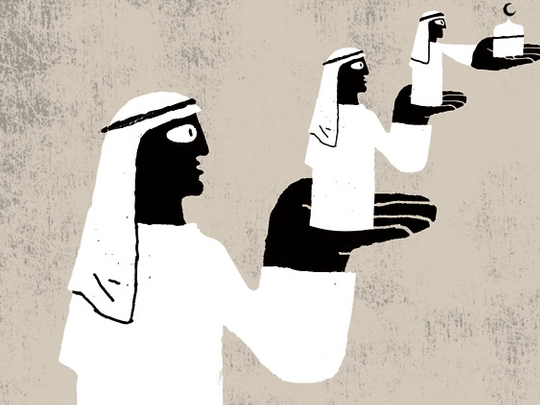
With the announcement two weeks ago by Shaikh Abdullah Bin Zayed Al Nahyan, UAE Minister of Foreign Affairs, that the international organisation of the Muslim Brotherhood is probably co-ordinating with a number of citizens in the UAE to intervene in local politics and destabilise the government, the issue of local Islamist movements and their activities in the Gulf has come out in the open. The question raised is: What would the Gulf Islamists like to achieve politically, as it is the oldest social, semi-organised group in the Gulf? It was established in Bahrain and Kuwait in the late 1940s and in Dubai in the late 1960s. It shied away from local politics and kept itself occupied with social work and collecting donations for fellow brothers elsewhere as sleeping partners.
Gradually, they entered politics, but off-shore when Afghanistan became the gathering point, local authorities in the Gulf decided to ignore their activities at the time. Their involvement in local politics grew steadily. In the 1980s, the local branch of the Brotherhood in Kuwait got into parliament, both Muslim Brothers and Salafists. More fundamentalist groups in Saudi Arabia were active in terrorism since their contempt of local authorities earned them the accusation of not being proper Muslims.
Early in 2002, the late Saudi crown prince and minister of interior, Nayef Bin Abdul Aziz, who knew a lot about the Islamist movements in the area, in a series of press announcements, warned of their activities. He accused the Muslim Brothers in the region of recruiting young citizens of the Gulf, from schools, universities and social clubs for their own goals and activities and of using Islam as their means of persuasion. Domestic and foreign observers where alarmed by the space given by authorities to those groups to operate. However, recently, the governments in the Gulf noted the threat from these groups. During a conference early this year, Lieutenant General Dahi Khalfan Tamim, the Chief of Dubai Police, was clear in accusing Muslim Brotherhood branches in the Gulf states, who did not just want to share power, but to take over power. The reactions that followed from the activists from all over the region proved once more the link between these outfits. The triumph by Muslim political movements in Egypt, Tunisia and other Arab Spring states — either in holding power or being a major part of it — is probably seen as a shot in the arm for political Muslim groups in the Gulf. However, there are some major logistical hurdles facing them.
First, most of the Gulf’s citizens still adhere to their alliance with local ruling families, who seem to be very close to the ordinary citizens, besides having adopted a policy of fair dispensation of state income by means of providing citizens with all the basic services such as free education, complete health care services and good housing schemes. Moreover, their efforts to build a new bureaucracy, to promote economic growth to benefit most citizens has always been acknowledged and appreciated by citizens. So the injustices that form the brunt of complaints in the heavily populated Arab countries are either minimal or non-existent in Gulf countries. These groups have only one means of influencing people — use religious slogans, but even that can be countered by providing a deeper understanding of Islam in schools and the media. Therefore, these groups are left with two options — either play the Sharia card or demand democracy!
Both paths are definitely hard to implement smoothly in the Arab Spring states. The governments in the Arab Spring states have not yet claimed that they are implementing Sharia. Such laws are open to many different interpretations and traditionally have a number of schools of thoughts.
Democracy, on the other hand, needs liberal attitudes to flourish, first by starting to accept others. For organisations like the Muslim Brotherhood and Salafists, this is difficult to achieve. Muslim Brotherhood consists solely of Sunnis. In multi-ethnic societies like the Gulf societies, it is hard to accept just one interpretation of political or religious issues. Furthermore, Gulf societies traditionally are open societies, being positioned on the shores. Cities like Manama, Dubai and Kuwait are free ports, trading with others in Africa and the Indian subcontinent. As a result, they are familiar with other ways of life and are exposed to different cultures. They have learned to accept other cultures and to live and let live with different sects and religions.
The Islamists mix politics and religion. It has not worked in Sudan and it looks like it will not be working in Iran either, despite all the efforts. The Egyptian branch of Muslim Brotherhood, the biggest and oldest, is trying a new approach. The political party they have formed is a tool in daily politics, it has accepted Egyptian norms — a sign of utilising modern means.
Religion and politics will be with us for some time to come, though the outcome is not clear yet. It depends on the developments within Arab Spring countries, especially Egypt, but from what is going on there and in Tunisia, things appear to be tough and probably bloody.
Meanwhile, the Gulf states will continue to suffer from the side-effects of the volitions and conflicts that appear on the political radar of the Middle East. The focus should be on reforming education and media — areas that the Gulf governments should pay greater attention to in order to prevent fundamentalist ideas from spreading among new generations. This needs understanding and moving towards reforms. Mohammed Alrumaihi is a professor of political sociology at Kuwait University.








